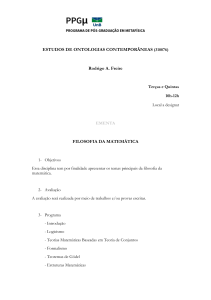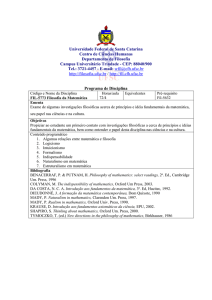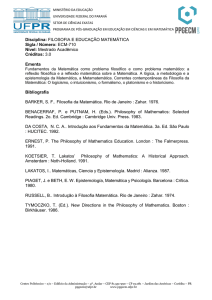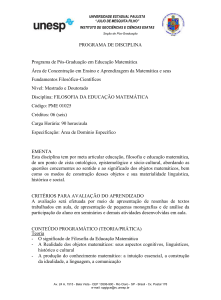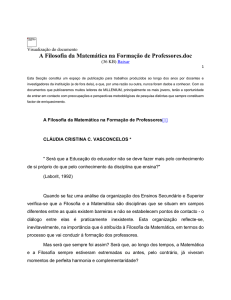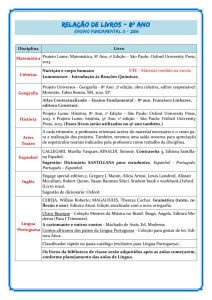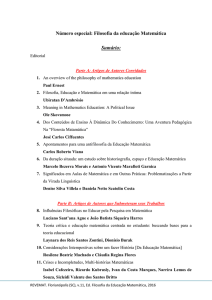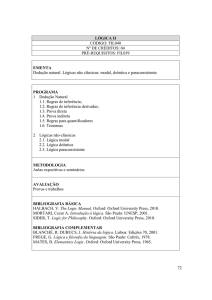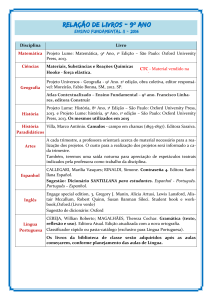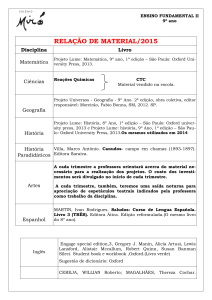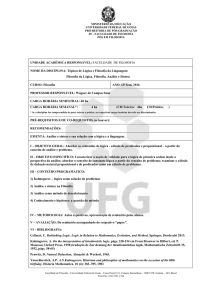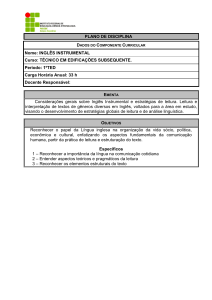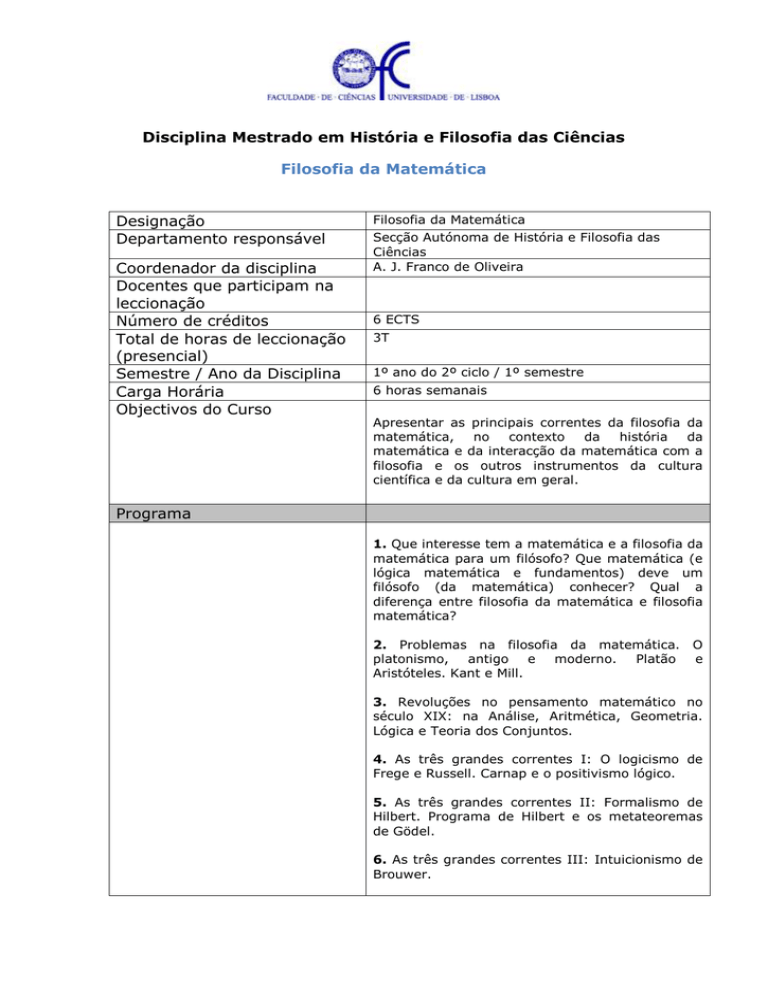
Disciplina Mestrado em História e Filosofia das Ciências
Filosofia da Matemática
Designação
Departamento responsável
Coordenador da disciplina
Docentes que participam na
leccionação
Número de créditos
Total de horas de leccionação
(presencial)
Semestre / Ano da Disciplina
Carga Horária
Objectivos do Curso
Filosofia da Matemática
Secção Autónoma de História e Filosofia das
Ciências
A. J. Franco de Oliveira
6 ECTS
3T
1º ano do 2º ciclo / 1º semestre
6 horas semanais
Apresentar as principais correntes da filosofia da
matemática,
no
contexto
da
história
da
matemática e da interacção da matemática com a
filosofia e os outros instrumentos da cultura
científica e da cultura em geral.
Programa
1. Que interesse tem a matemática e a filosofia da
matemática para um filósofo? Que matemática (e
lógica matemática e fundamentos) deve um
filósofo (da matemática) conhecer? Qual a
diferença entre filosofia da matemática e filosofia
matemática?
2. Problemas na filosofia da matemática. O
platonismo,
antigo e moderno.
Platão
e
Aristóteles. Kant e Mill.
3. Revoluções no pensamento matemático no
século XIX: na Análise, Aritmética, Geometria.
Lógica e Teoria dos Conjuntos.
4. As três grandes correntes I: O logicismo de
Frege e Russell. Carnap e o positivismo lógico.
5. As três grandes correntes II: Formalismo de
Hilbert. Programa de Hilbert e os metateoremas
de Gödel.
6. As três grandes correntes III: Intuicionismo de
Brouwer.
7. Temas contemporâneos.
Bibliografia recomendada
Benacerraf, P. and Putnam, H. (eds) (1983).
Philosophy
of
Mathematics,
2nd
edition,
Cambridge University Press.
Brown, J.R. (2008). Philosophy of Mathematics, A
Contemporary Introduction to the World of Proofs
and Pictures, Second edition, Routledge.
Dedekind, R., (1963). Essays on the Theory of
Numbers (I. Continuity and Irrational Numbers;
II. The Nature and Meaning of Numbers), Dover,
1963; tb. em Ewald (1996) 765-779, 790-833;
trad. port. de II (Continuidade e números
irracionais) por A.J.F. Oliveira em Bol. da Soc.
Port. de Matemática 41 (Outubro de 1999), 97119.
Dummett, M. (1977). Elements of intuitionism,
Oxford U.P.
Epstein, R. L., Carnielli, W. A. (2000).
Computability: Computable Functions, Logic, and
the Foundations of Mathematics, Third edition,
Wadsworth & Brooks/Cole.
Ewald, W. (1996) (ed.). From Kant to Hilbert: A
Source Book in the Foundations of Mathematics, 2
vols., Oxford University Press.
Ferreirós, J. (1999) Labyrinth of Thought, A
History of Set Theory and its Role in Modern
Mathematics, Birkhäuser.
George, A., Velleman, D. J. (2002) Philosophies
of Mathematics, Blackwell.
Gödel, K. (1986-95) Collected Works (edited by
S. Feferman), Vols. I-III, Oxford University Press.
Hatcher, W.S. (1982) The Logical Foundations of
Mathematics, Pergamon Press.
Heyting, A. (1956) Intuitionism, North-Holland.
Hofstadter, D.R. (2000) (trad. port. da edição do
XX aniversário (Gödel, Escher, Bach: An Eternal
Golden Braid, Penguin Books, 1999) coordenada
por A. J. F. Oliveira) Gödel, Escher, Bach: Laços
Eternos, Gradiva.
Hilbert, D. (2003) Fundamentos da Geometria.
Trad. port. por Maria Pilar Ribeiro, Paulino L.
Fortes e A. J. Franco de Oliveira, com a
colaboração de J. da Silva Paulo e A. Vaz Ferreira,
baseada na 7.ª edição alemã (1930), com dez
apêndices do autor e suplementos por P. Bernays,
H. Poincaré e F. Enriques, 2.ª edição portuguesa,
Gradiva, 2003 (Trad. ingl. Foundations of
Geometry. Second English Edition, Revised and
Enlarged by Paul Bernays, Open Court, 1971).
Kneebone, G. T. (1963) Mathematical Logic and
the Foundations of Mathematics, Van Nostrand,
1963.
Körner,
S.
(1962),
The
Philosophy
of
Mathematics, Harper & Row. Reimp. Dover 1986.
Lakatos, I. (1967) (editor), Problems in the
Philosophy of Mathematics, Amsterdam: North
Holland.
Maddy, P. (1990) Realism in
Oxford: Oxford University Press.
Mathematics,
____. (1997) Naturalism in Mathematics, Oxford:
Oxford University Press.
Mendelson,
E.
(1996)
Introduction
Mathematical Logic, 4th edition, Wadsworth.
to
Moore, A. W. (1990) The Infinite, Routledge.
Oliveira, A.J.F. (1982) Teoria dos conjuntos,
intuitiva e axiomática (ZFC), Escolar Editora.
Pollard, S. (1990) Philosophical Introduction to
Set Theory, Notre Dame University Press.
Putnam, H. (1975) ‘What is Mathematical
Truth?’, in Mathematics, Matter and Method:
Philosophical Papers, vol. I, Cambridge University
Press.
Russell, B. (1919) Introduction to Mathematical
Philosophy, George Allen & Unwin; reimp. Dover,
1993.
Shapiro, S. (1997) Philosophy of Mathematics:
Structure and Ontology, Oxford University Press.
____. (2000) Thinking
Oxford University Press.
About
Mathematics,
____. (2005) (editor) The Oxford Handbook of
Philosophy of Mathematics and Logic, 2 vols.
Oxford Univ. Press.
Tait, W. W. (1986) ‘Truth and Proof: The
Platonism of Mathematics’, Synthese, 341-70.
Tiles, M. (1989) The Philosophy of Set Theory,
Blackwell; reimp. Dover, 2004.
Tymoczko, T. (1998) New Directions in the
Philosophy of Mathematics, Revised and expanded
edition, Princeton U.P.
Van Heijenoort, J. (1971) (ed.), From Frege to
Gödel, A Source Book in Mathematical Logic,
1879-1931, Harvard University Press.
Métodos de ensino
Métodos de avaliação
Língua de ensino
Exposição, comentário de textos, trabalho de
seminário, apresentações dos alunos.
Trabalho de seminário (20%), apresentação oral
(30%) e trabalho individual final (50%)
Português
(24.07.2008)

